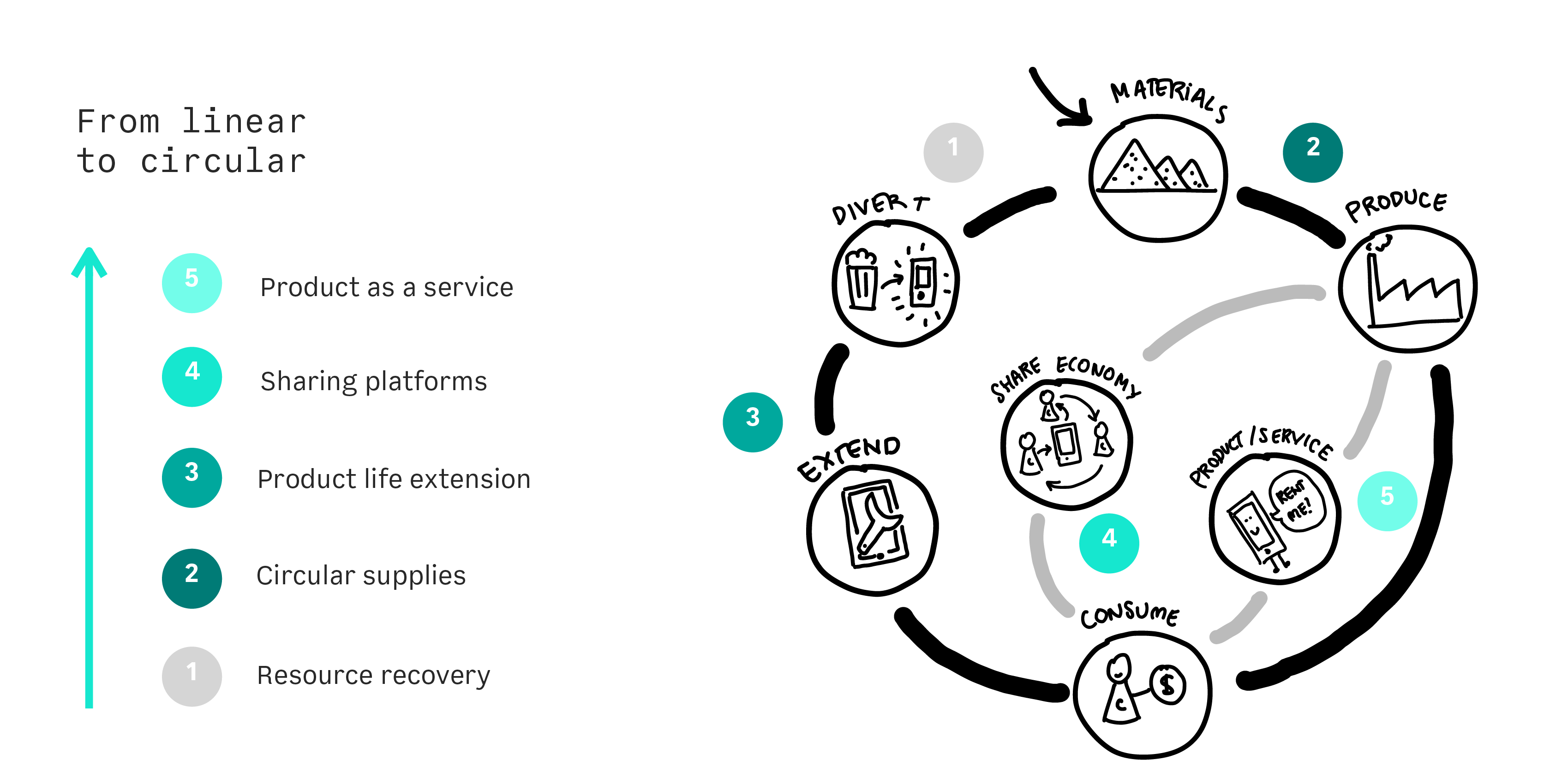How shifting our mindsets can help us create products and services that do good by people, the planet and businesses
Systems thinking is a powerful tool that helps us better navigate the complexity and delicate balance of the socio-political and natural ecosystems within which our businesses operate. In order for any business to become resilient, to withstand the shocks and stresses in their value chain they must apply a systemic perspective.
Applying a systems thinking approach to sustainability enables us to better see and understand the impacts of our business decisions and avoid unintended consequences. It also enables us to explore opportunities for innovation and design our approaches for systems change. Be it incremental changes or broader changes, we want to find a practical way for us to be responsible for the impact our work has on people and planet.
Systems thinking is a mindset that helps us to untangle and work within the complexity of life on Earth. It helps us to better understand the impact of our work on the world around us.
A system is a set of related components that work together in a particular environment to perform whatever functions are required to achieve the system’s objective -Donella Meadows
To be responsible for what we create and how we innovate, we need to do our best to understand how the system works before we put new things into it. But it can be difficult to predict all of the long term impacts of every business decision and any new product, service or innovation.
To be able to impact the system in a way that is beneficial to people, the planet and businesses we need to understand what key levers we need to push, pull, add or remove, to encourage the system to work in a different way or have a new purpose altogether.
Doing good in today’s world is hard.
Innovative or disruptive solutions can propel us into the future. It can provide new and better ways to do things or allow us to do things we couldn’t before. Most often opening a space for business growth and investment opportunities along with it. When we think about a single product or service we know that a great amount of components need to be considered to make it work. What is most often not considered are the long term systemic impacts. For example, the rise of electric scooters has facilitated micro-mobility while simultaneously having an enormous impact on road safety and even questionable impacts on the environment. To create sustainable solutions that are able to change over time, we need to consider the systemic impacts of these potential solutions before we invest in bringing new ideas to life. When systems thinking is not part of the innovation process, then solutions and business decisions could do more harm than good.
Mapping relationships and dependencies helps to understand the implications of actions — intended and otherwise. Systems thinking catches unplanned and secondary consequences before they occur so they can be managed. Source
It is far more difficult to amend systemic impacts when funding and resources have already been invested and a product or service has already been rolled out. If we approach the process in a systemic way from the beginning we can consider the inevitable unforeseen impacts and create solutions that are able to adapt and change based on feedback over time. It can help us understand the impact of scaling the solutions over time and how it will change or interact with the system it ultimately operates within.
Where does sustainability come in, how does it relate to systems thinking?
Globally there is an agreement on what needs to be done to build an equitable world both on a detailed and broader level with the Sustainable Development Goals By the United Nations. There are other models like Donut Economics by Kate Raworth that help us to visualise a different way of measuring ourselves against socio-political, and natural systemic issues.
Thinking systemically about sustainability helps us to see the connections between the different goals and how we as businesses can contribute. It means we can focus on where our core business lies while at the same time be able to see the secondary impacts of our work, increasing the positive impacts on the system and avoiding unanticipated and undesirable consequences on people and planet.
A mature understanding of sustainability management requires studies to adopt a multidisciplinary systemic lens capable of appreciating the interconnectivity of economic, political, social and ecological issues across temporal and spatial dimensions. -Journal of Cleaner Production
We need to understand the systemic impact of our work and apply systems thinking in practice
Sitting in the systemic space can be challenging. Thinking about the multitude of possible long and short term systemic impacts of a new solution very quickly gets overwhelming. And such feelings might lead to an overcoming want to simply give up.
However the goal of systems thinking is not about changing the system from the get-go but to become more aware of the system itself. We want to be “Enabling the system to become aware of itself.” Otto Scharmer, Author of Theory U Senior Lecturer at M.I.T. And with an increase of awareness in each business function, we can begin to create change and influence the system. This process begins by using tools like mapping and visualisation. Helping those involved to get on the same page, to have productive discussions, see new opportunities and make better more informed decisions.

Picture description: using mapping to understand understand impact and opportunity at scale
If you’d like to learn more about this process and how to apply it to your business we have a workshop that we’d love to tell you more about. The workshop covers the basics of systems thinking and unpacks why its perspective is beneficial to making business decisions, especially from a sustainable perspective. Get in touch!
- Common questions about sustainability and systems thinking
- What is systems thinking in sustainability?
- Sustainable systems thinking is a mindset that helps us to untangle and work within the complexity of life on Earth. It helps us to better understand the impact of our work on the world around us and be responsible for what we create and how we innovate.
- What does systems thinking have to do with a sustainable future?
- Applying a systems thinking approach to sustainability enables us to better see and understand the impacts of our business decisions and avoid unintended consequences. It also enables us to explore opportunities for innovation and design our approaches for systems change.
 Sabina PopinService & Strategic Design Lead
Sabina PopinService & Strategic Design Lead







